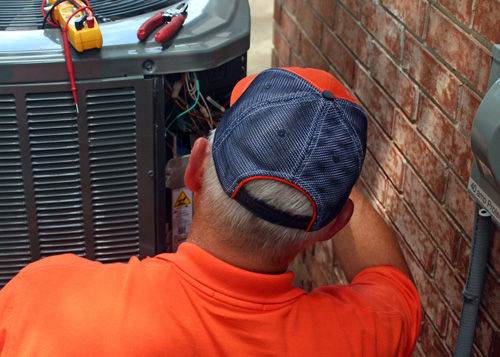A spring AC tune up is the best way to get your AC unit ready for the summer’s scorching heat. Summer heat is harder on your air conditioner than the 24 Hours of Le Mans is on racing cars like these, featured in dailysportscar.com.
In fact, it’s far worse. During the hottest times of the year in North Texas, it seems like the air conditioner is always running. Your central HVAC system can average more than 3,300 hours of annual run time, and here, the air conditioning accounts for the majority of that time.
If you were to drive your car that long at 65 mph (not even close to a Le Mans pace), you could log more than 214,000 miles in a single year, which leads to this question:
Would you drive your car that long without a tune up or any kind of maintenance? Of course not. And just as the mechanical parts of an automobile can fail, so can HVAC system parts. AC tune ups are your best way to catch small problems before they become emergencies.
Regular air conditioning maintenance can help reduce the risk of breakdowns, increase efficiency, add to the lifespan of the unit and benefit both your budget and the environment.
Let’s consider what happens when you have a spring AC tune up.
1. Reduced Risk of an Air Conditioner Breakdown
In a time when so many things in the world are disposable, it’s a comfort that modern AC units are built to last up to 15 years. But just as with anything mechanically complex, central air conditioning can stop working. Individual air conditioner parts can and do wear out, which can cause system failure.
 Perhaps the worst part is that the risk of the central air conditioner breaking down is greatest when the AC unit is under the most strain – when the temperatures are highest. When the air conditioner is working its hardest, individual parts are stressed and normal wear and tear is magnified.
Perhaps the worst part is that the risk of the central air conditioner breaking down is greatest when the AC unit is under the most strain – when the temperatures are highest. When the air conditioner is working its hardest, individual parts are stressed and normal wear and tear is magnified.
What that means is that a terrible surprise — your air conditioning not cooling – is most likely to happen when you need it the most.
That’s one reason an annual AC tune up is valuable. A licensed AC pro can identify any small problem that might lead to a larger problem and prevent the air conditioner from breaking down at the worst possible time.
2. Improved Energy Efficiency
An air conditioner that is not properly maintained is more likely to break down. But even though the AC unit is still working, it might not be operating at peak efficiency. In that case, it must work harder, and use more energy, to keep your home comfortable.
And just how much energy does an air conditioner use? Well, a lot. The U.S. Department of Energy estimates that Americans spend about $29 billion annually to cool their homes. Air conditioning in the average US home accounts for 12% of all energy bills, but in in hot and humid areas like North Texas, the number is 27%.
More energy means more money out of your pocket, and it can really add up when the air conditioner is running constantly in the summer. A well-maintained AC unit operates as close as possible to its original factory specifications, and in addition to being better for your budget, it’s better for the environment.
It’s no surprise that the U.S. Department of Energy and Environmental Protection Agency (EPA) recommend annual air conditioner maintenance.
3. Better Indoor Air Quality
Improved energy efficiency is great for your wallet and the environment, but better air quality is just as important. It may be even more important, considering the way indoor air quality can affect the health of you and your family.
Indoor air quality, also known as IAQ, is defined by the EPA as “the air quality within and around buildings and structures, especially as it relates to the health and comfort of building occupants.”
During an AC tune up, an HVAC pro can change the filters and inspect the system for pollutants and biological contaminants such as mold and bacteria. That’s important because poor indoor air quality directly affects the health and well-being of people living there.
Poor indoor air quality has even been linked to what is now commonly referred to as “sick building syndrome,” a term used for situations in which people in the same dwelling suffer from chronic illnesses related to the poor indoor air quality.
4. Air Conditioning Tuneups Save Money
As mentioned above, well-maintained central air conditioners save money by operating at maximum efficiency. But there are several other ways – and in some cases, more impactful ways – that AC tune ups save money.
Maintenance is nearly always less expensive than a repair job
 An AC tune up is affordable, and when compared to the potential AC repair cost, it’s downright cheap. The cost for an air conditioner tune up varies from company to company, but it’s almost always far less expensive than what a homeowner must pay when there is a breakdown.
An AC tune up is affordable, and when compared to the potential AC repair cost, it’s downright cheap. The cost for an air conditioner tune up varies from company to company, but it’s almost always far less expensive than what a homeowner must pay when there is a breakdown.
For example, the air conditioning compressor is an integral part of the unit because it transports the refrigerant through the AC system to perform the cooling. When the compressor goes out, the air conditioning goes out, and the repair of replacement of an air conditioning compressor can be an expensive job – think thousands of dollars, not hundreds.
But a common reason for compressor failure is when it overheats, and that can be caused by a refrigerant leak, dirty coils or blocked refrigerant lines. All three of those problems can be identified during an inexpensive AC tuneup before they lead to a potentially expensive air conditioning repair.
What’s more, depending on your air conditioner’s overall condition and the price you pay to have it tuned up, you stand to recover more than the cost of the tune up due to lower electric bills.
Increasing the lifespan of the AC unit is the biggest money saver
As mentioned earlier, an HVAC system is designed to last up to 15 years. But to enjoy the benefits of that lifespan, regular maintenance is essential. Homeowners can perform some of that maintenance, such as replacing filters, but there are some tasks that are best performed by a professional.
In addition, only a licensed AC pro is trained to identify the problems that can shorten the lifespan of an air conditioner. An AC tune up is the easy way to have that expertise working for you and protecting one of the biggest investments in your home.
5. Lack of Proper Maintenance Can Void Your Warranty
Most central air conditioning systems come with a parts warranty of at least five years, and fortunately, a well-maintained system is unlikely to need the warranty. But it’s still nice for homeowners to have that protection. Most dealers offer extended warranties of up to 10 years or more, which are well worth considering.
If a part under warranty does fail, however, the manufacturer may ask for documentation that your system has received proper maintenance. Manufacturers typically stipulate that annual air conditioning maintenance is necessary to obtain warranty service. Your HVAC technician should provide documentation of maintenance service that you can keep with your records.
6. Peace of Mind
 Can the value of this really be overstated?
Can the value of this really be overstated?
On the hottest summer days, walking into your house is not just refreshing, it’s a full-blown relief. Some days the heat can be so blistering that it’s a wonder how anyone survived before air conditioning became available to most homeowners nearly 100 years ago.
Everyone at some point has worried about what would happen if their central air conditioner went kaput in the middle of a heat wave. Long before things get that serious you should know the signs that it may be time to consider replacing instead of repairing your central air conditioning.
When you get an AC tune up before the hot weather really kicks in, you’ll know that your air conditioner is ready for that 200,000 mile drive.
What Should an AC Tune Up include?
A spring AC tuneup is an annual physical for your air conditioning system. An HVAC professional will do a visual inspection to make sure the air conditioning unit is “healthy” and operating efficiently. As a minimum, the checklist should include:
- Check evaporator coil (the one inside your home)
- Clean primary and secondary drain lines that carry away condensation
- Check and clean condenser coil (in the box outside)
- Check operation of condenser fan
- Check operating pressures for proper refrigerant charge
- Test ductwork for proper airflow
- Monitor air conditioning cycle and adjust blower components
- Change air filter, as needed
- Lubricate all moving parts, where applicable
- Monitor voltage and amperage draw on all motors
- Check and tighten all loose electrical connections
- Clean and adjust thermostat as necessary
- Check all AC parts for general wear and tear
An air conditioner tune up also offers homeowners the chance to ask questions of a licensed AC pro and learn about their air conditioning system. Your technician can provide the answers, as well as give tips on the ways you can keep your central air conditioner running smoothly between tune ups.
Conclusion
Preventive maintenance helps all types of machines perform better and last longer. For central air conditioners, better performance and longer lifespan are a double dose of savings for homeowners. The added benefits of a well-maintained AC unit — including helping the environment, improving a home’s indoor air quality and avoiding the inconvenience and expense of an unexpected breakdown — are more reasons an spring AC tune up is vital.
Although an air conditioning tuneup can be done later in the summer, the best time is in the spring, before hot weather sets in. A spring tune up will give you peace of mind that your central AC is prepared to keep your home comfortable when the temperatures sizzle. The combination of a licensed AC professional and regularly scheduled maintenance will keep your air conditioning unit running strong for years to come.
Are you and your air conditioner ready for the hot months ahead? Let’s knock that spring AC tune up with billyGO!

